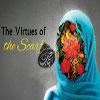
Three-quarters of Brits who convert to Islam are female. A newly-released study outlines the problems that women face in Britain.
There has been a huge increase in the number of young, white Britons choosing to become Muslims, yet several recent studies have shown how these women experience a severe lack of help during this transition.
As this week has seen two and half million Muslims celebrate the annual religious holiday of Eid; displaying their commitment to hajj by beginning their pilgrimage to Mecca, Richard Peppiatt from the Independent has found that of the 5,200 British nationals who converted to Islam in 2010, over 50% are white and three quarters of them are female.
In addition, researchers based at Swansea University have found that out of the 40,000 people in Britain converting to Islam over the past 10 years, the majority of these are female. There is anecdotal evidence to suggest that conversion is on the increase and Kevin Brice’s research from his ‘A minority within a minority’ report, produced by Swansea University on behalf of Faith Matters, indicates that while 53% of white British converts were female for those who converted prior to 2001, the figure rose to 66% for those who converted between 2002 and 2010.
Despite this increase, many Muslim converts experience a daily fight, to integrate their newly held beliefs within the wider confines of society, where they are often perceived as outsiders, despite similar western backgrounds. A recent study in Leicester found that a staggering 93% of mosques in the local area realised they required services for new Muslims, but only 7% of these were making steps towards meeting this need.
Brice, who conducted vast research into this sociological development, spoke to The Fresh Outlook about some of the reasons why women convert to Islam. “Islam offers women a sense of protection and identity – this may sound counter-intuitive given the way Islam is normally portrayed in the media, but some women find the modest clothing required by Islam “’liberating’ – it’s no longer about how you look, it’s getting free from the idea that a person is defined by their dress size,” he said.
“Islam is seen as more supportive of family values, and women have a clearly defined role within the family. Many converts note their disquiet with alcohol and drunkenness, a lack of morality and sexual permissiveness and an unconstrained consumerism, all of which are seen as prevalent in British society – Islam offers them a different approach,” he added.
Brice also spoke about a number of misconceptions related to Muslim converts, saying: “It is important to recognise that the majority of converts have converted through free choice and see themselves as both British and Muslim."
By Natasha Spencer – The Fresh Outlook
source : irib













